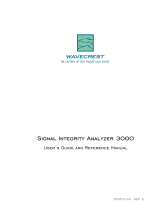Page is loading ...

SOURCE OF UNCERTAINTY - MODEL 266t
Eurorack 200 series
input
input
inputs
inputs
low high
c.v. in
c.v. out
Noise Source:
- Pink noise (-3db/oct - low frequency biased)
- White noise (flat - equal frequency balanced)
- Blue noise (+3db/oct - high frequency biased)
Fluctuating Random Voltages:
- CV Input controls the probable rate of random voltage change
- Knob offsets the probable rate change from slow 0.05hz to 50hz
- CV Output of voltages with LED indicating the fluctuation rate
Sample and Hold:
- Pulse Input samples the voltage at the CV Input
- Pulse “alt” divides the incoming pulse into alternating pulse outputs
- CV Input for periodic, continuous or fluctuating voltages
- CV Output of the complete voltages
- CV Output “alt” divides the voltages into alternating outputs (great for ping pong effects)
Integrator:
- Input is looking for discrete or stepped voltages
- The knob proportionally smooths out the incoming voltage from 0.01
(no smoothing) to 10 (dramatic smoothing, glissandi)
- CV Input controls the smoothing potentiometer
- TR1 is a trimmer on the back of the module, it adjust the range of the Integrator.
Quantized Random Voltage:
- Pulse Input activates a random stepped
voltage at the Output
- The knob offsets the varying number of steps
from setting 1 to setting 6
- CV Input controls the number of steps
- n+1 is more locally scaled in the 5V range
- 2^n is more equally distributed over a 10V
range
Stored Random Voltage:
- Pulse Input activates a random stepped
voltage at the CV Outputs
- The left CV Output is an evenly distributed
random voltage
- The right CV Output has a potentiometer and
CV input to determine the random voltage
distribution.
- CV In affects the “curve” distribution of the
right CV Output
- The knob offsets the “curve” distribution of the
right CV Output.
Fully counterclockwise skews in favor of lower
voltages. The middle is a bell curve distribution
and clockwise skews toward higher voltages.
Specifications:
Size: 24 HP - Depth: 25mm
Power: +12V 150mA / -12V 100mA
/




